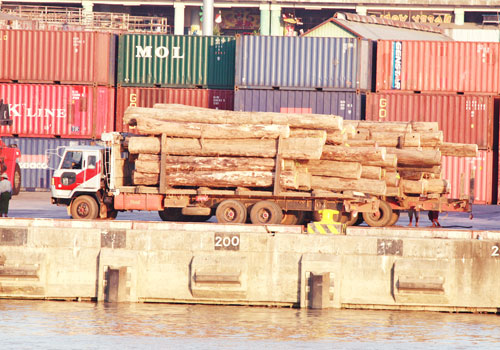
Hong Kong-based company Kerry Logistics has won a concession to operate two inland ports in Myanmar, part of the government’s plan to construct a network of dry ports across the country under a United Nations initiative.
Myanmar’s sea ports are receiving an administrative overhaul with the help of Japan’s Hitachi.StaffMyanmar’s sea ports are receiving an administrative overhaul with the help of Japan’s Hitachi.Staff
Kerry Logistics’ subsidiary KLN Singapore signed the contract with the Ministry of Rail Transportation to operate inland ports in Yangon and Mandalay, Kerry Logistics announced on January 11.
KLN will help construct the two dry ports along with local company Resources Group Logistics (RGL). Both companies have been granted concessions to build and to operate the dry ports.
The Ministry of Rail Transportation announced the tender back in August 2014, and received applications from 11 companies, including China-Myanmar and India-Myanmar joint-venture firms.
The ministry expects the project to be finished by December 2017. KLN and RGL each have separate but equal shares of the 80-acre site at Ywarthargyi near Yangon. KLN has a slightly larger share of the 80-acre site at Mandalay.
KLN will make an initial US$20 million investment in the dry ports, and will invest a total of $42 million. Resources Group Logistics will invest $39 million, and will hire China Communications Constructions as an advisory, RGL’s managing director U Myint Maw said.
KLN expects to create jobs for some 250 Myanmar citizens, and after finishing the project plans to staff the ports with Myanmar nationals, U Nyi Htut, general manager of KLN, said.
The firm will have a concession to operate the ports for 50 years, with the option of two subsequent 10-year extensions, said Thura U Aung Myo Myint, general manager of Myanma Railways and secretary of the project group.
He said the land use premium on the sites would be $26,247 per acre, and an annual rent of $5500 per acre would be charged on top of this.
The ports at Yangon and Mandalay are part of Myanmar’s plan to develop dry ports in eight locations across the country: Yangon, Mandalay, Muse, Tamu, Mawlamyine, Monywar, Bago and Pyay, said Thura U Aung Myo Myint.
This is in turn part of a wider agreement on dry ports under the United Nations Economic and Social Commission for Asia and the Pacific (ESCAP). Myanmar is one of the 14 ESCAP member countries.
Dry ports can help combine the use of road, rail, sea and waterways when moving cargo across and between countries. Many administrative processes, including custom checks, will be completed in advance at the dry ports in Yangon and Mandalay, removing the need to perform the checks at the sea port, said U Saw Valentine, an adviser to Myanma Railways. The dry ports will also host banking and insurance companies.
The government intends to develop the other six dry port sites by 2020.
Myanmar’s sea ports, meanwhile, are receiving an administrative overhaul with the help of Japanese firm Hitachi, which hopes to have an electronic data system up and running by 2017. Many ports still rely on paper records.
KLN’s concession on the ports comes just a few months after Kerry Logistics opened new Myanmar routes on its cross-border road transportation network, known as KART, which provides long-haul trucking connections between Thailand and other ASEAN countries.
Kerry Logistics introduced a Bangkok-Yangon route and a Shanghai-Kunming-Mandalay-Yangon route in the last quarter of 2015, Hong Kong-based Citi transport analyst Michael Beer wrote in a recent research note.
Although the company is improving the KART road network across the ASEAN region, it also has plans for a long-term rail strategy, Mr Beer said. Of the three major projects the firm is engaged in across the Greater Mekong region, one involves building two rail terminals in Mandalay and Yangon, he said. Kerry Logistics could not be reached for comment yesterday.
The other two projects are an expansion of the Siam Seaport in Thailand, and construction of a free-trade zone outside Phnom Penh – which will better link the firm’s operations in Vietnam to those in Thailand.
An estimate from Citi analysts in November 2015 suggested these three projects would cost around HK$800 million (US$103 million) over the next 18 to 36 months.
Kerry Logistics is also making investments and acquisitions in Indonesia, Malaysia, Singapore and the Philippines, as part of a “Pan-ASEAN express network”, according to the Citi analyst.
The logistics firm’s advantage is that it has existing delivery networks such as KART – launched in 2007 – that it can use to take advantage of ASEAN’s nascent but growing e-commerce market, said Mr Beer.
The Asia-Pacific e-commerce logistics market is expected to reach $175 billion by 2016, buoyed by a youthful population of over 620 million that is becoming increasingly urban, according to Citi.
Internet penetration is rising quickly in ASEAN countries like Indonesia, Thailand and more recently Myanmar, although the latter’s e-commerce market is still just finding its feet.
Source: http://www.mmtimes.com/index.php/business/18450-kerry-logistics-kicks-off-myanmar-s-dry-port-plan.html

